
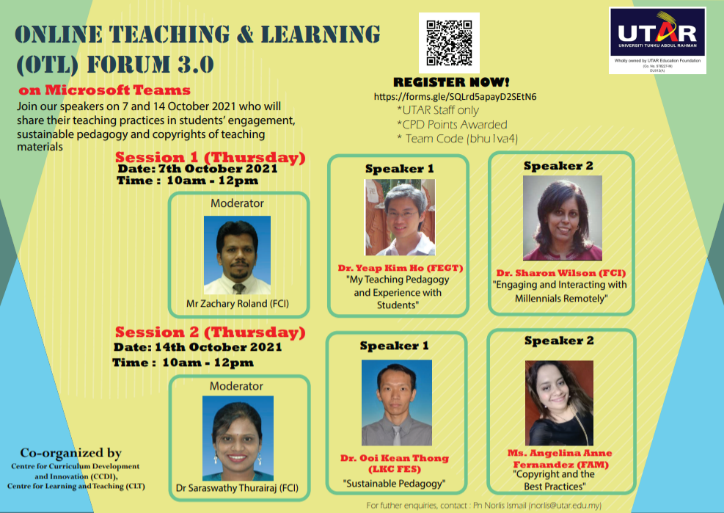
The webinar’s poster
Centre for Curriculum Development and Innovation (CCDI) and Centre for Learning and Teaching (CLT) jointly organised an online forum titled “Online Teaching and Learning (OTL) Forum 3.0” on 14 October 2021 via Zoom. The online forum received a total of 104 participants in attendance.
The speakers for this forum were Lee Kong Chian Faculty of Engineering and Science (LKC FES) Department of Surveying lecturer Dr Ooi Kean Thong and Faculty of Accountancy and Management (FAM) Department of International Business lecturer Angelina Anne Fernandez. The webinar was moderated by Faculty of Creative Industries (FCI) lecturer Dr Saraswathy Thurairaj.
The aim of the forum was to educate participants the purpose of sustainable pedagogy in education to move forward to a futuristic teaching environment as well as to gain insight into the copyright practices locally and internationally.
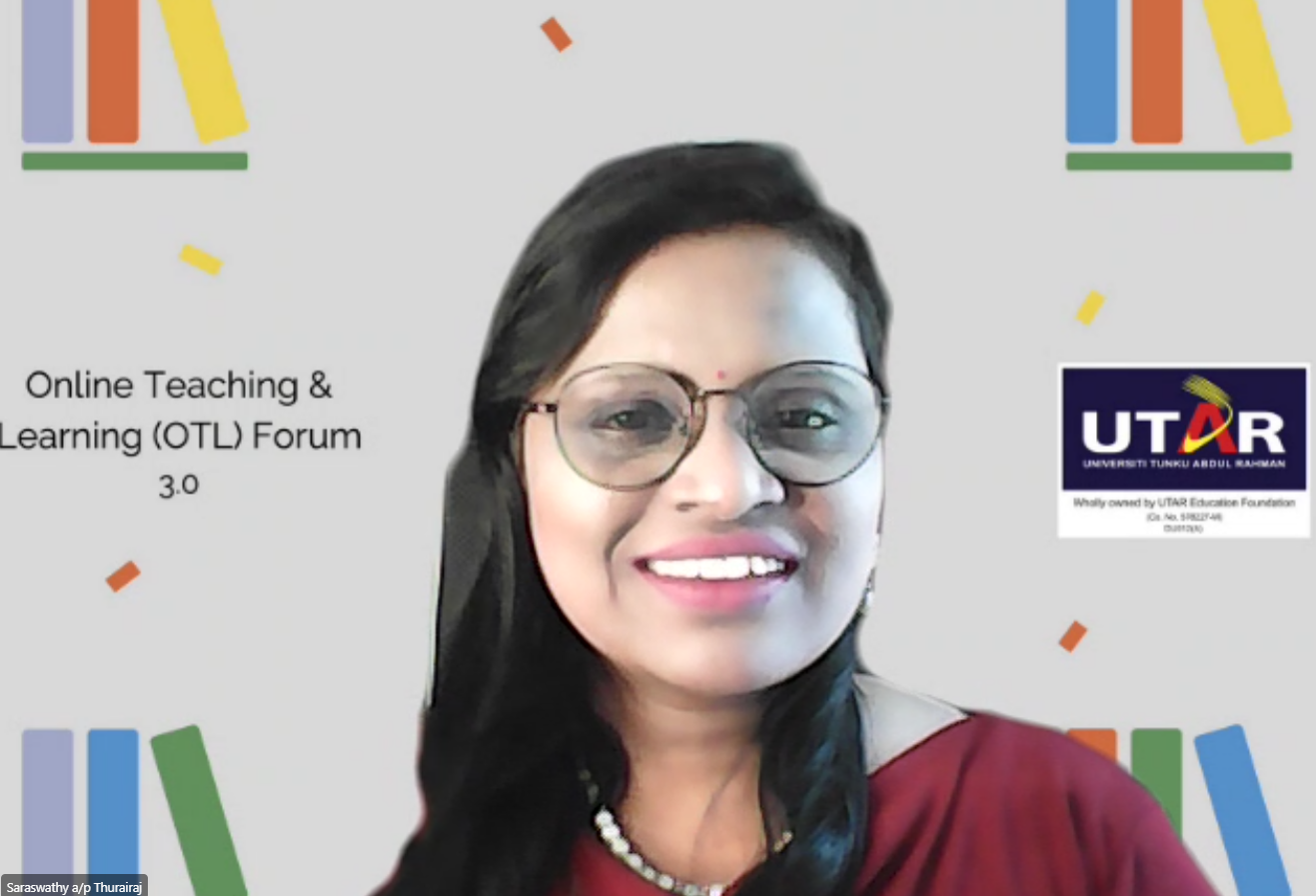
The webinar’s moderator Dr Saraswathy
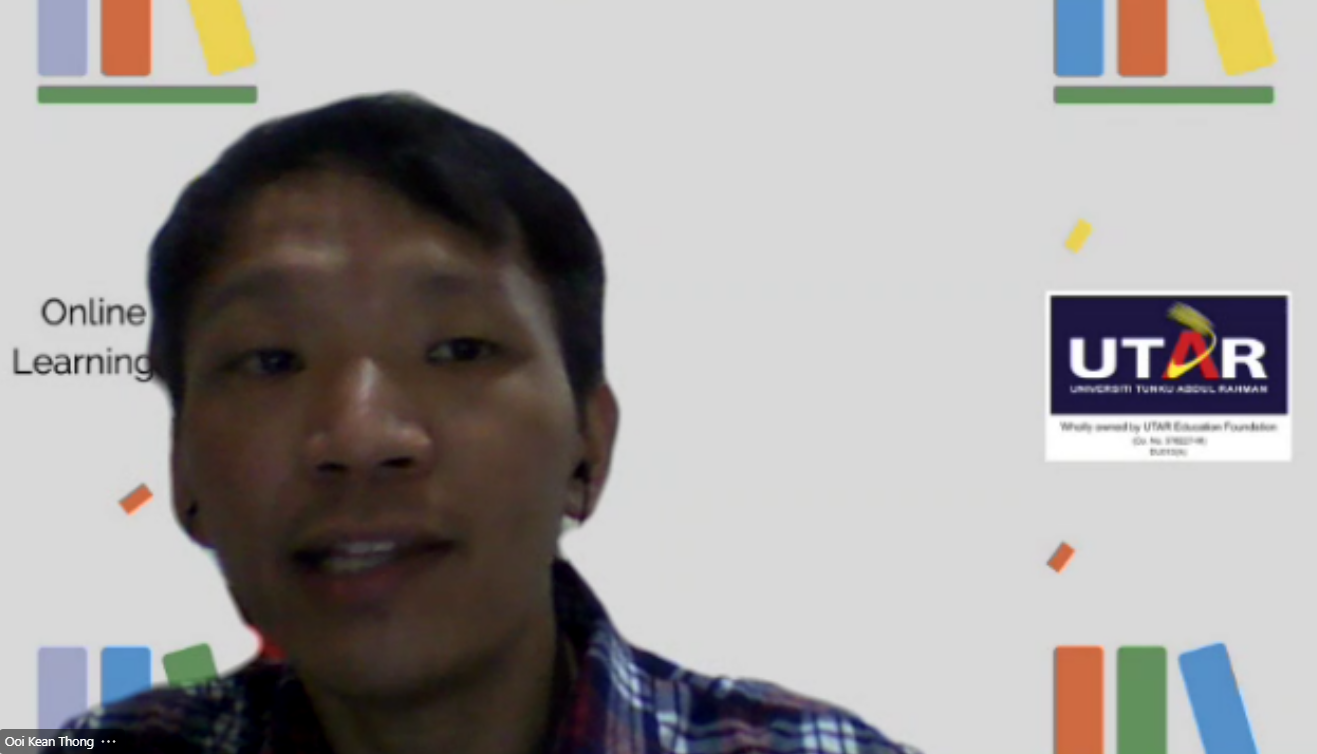
Dr Ooi during the sharing session
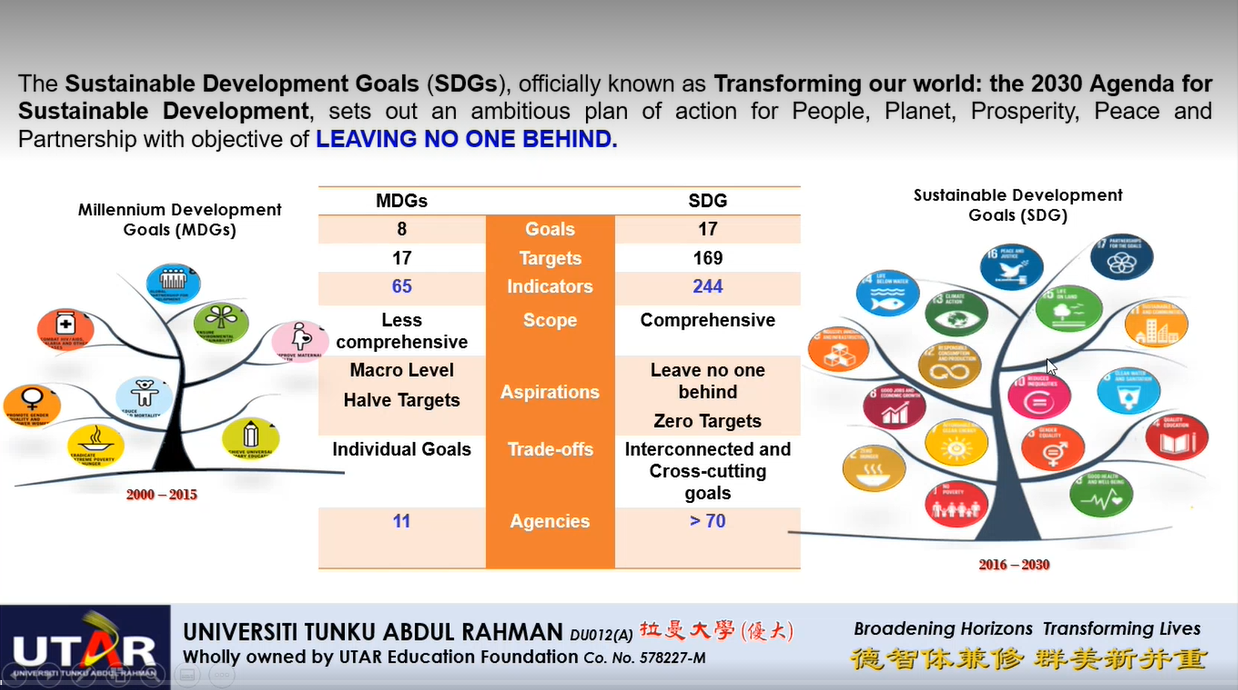
Dr Ooi showing the comparison between MDGs and SDG
Dr Ooi, in his topic, “Sustainable Pedagogy” said, “At the beginning of the new millennium in 2000, the world leaders gathered at the United Nations (UN) to shape a broad vision to fight poverty in its many dimension. And, that vision was translated into eight Millennium Development Goals (MDGs). The MDG framework has guided the development work across the world for the past 15 years. But now, the UN has expanded the global development goals with Sustainable Development Goals (SDG), which is officially known as ‘Transforming Our World: the 2030 Agenda for Sustainable Development’. It sets out an ambitious plan of action for People, Planet, Prosperity, Peace and Partnership with the objective of leaving no one behind. The SDGs are categorised into 17 goals covering multiple aspects of growth and development.”
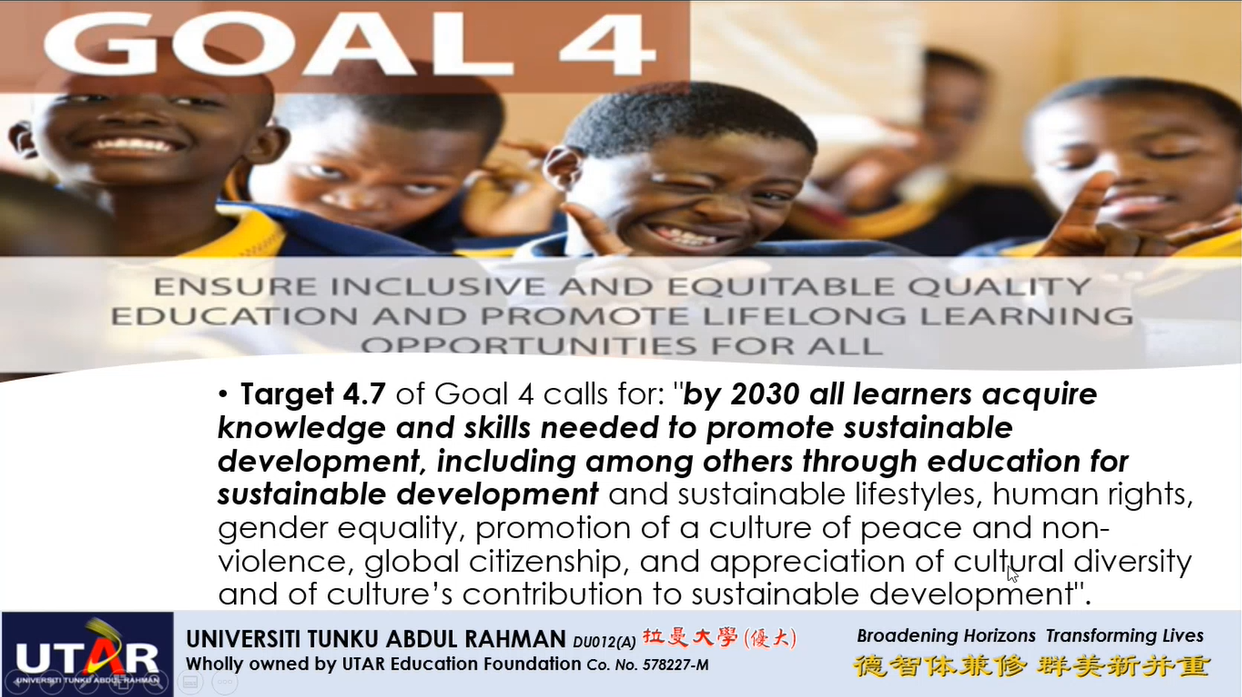
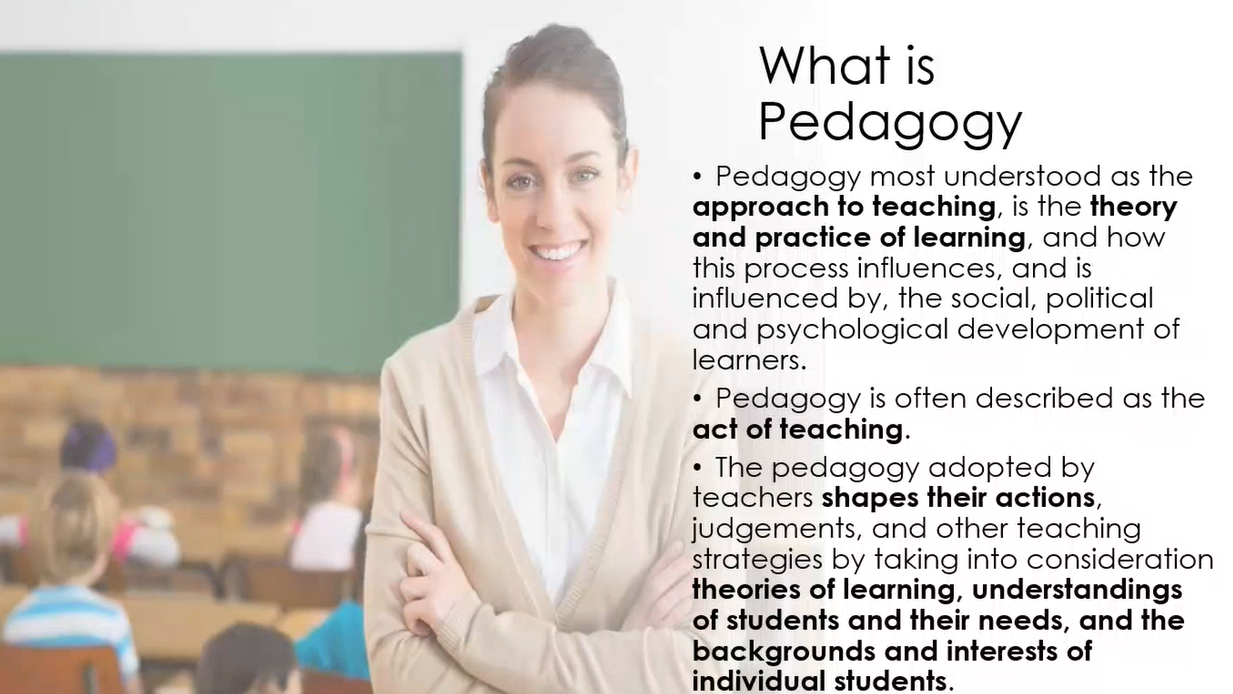
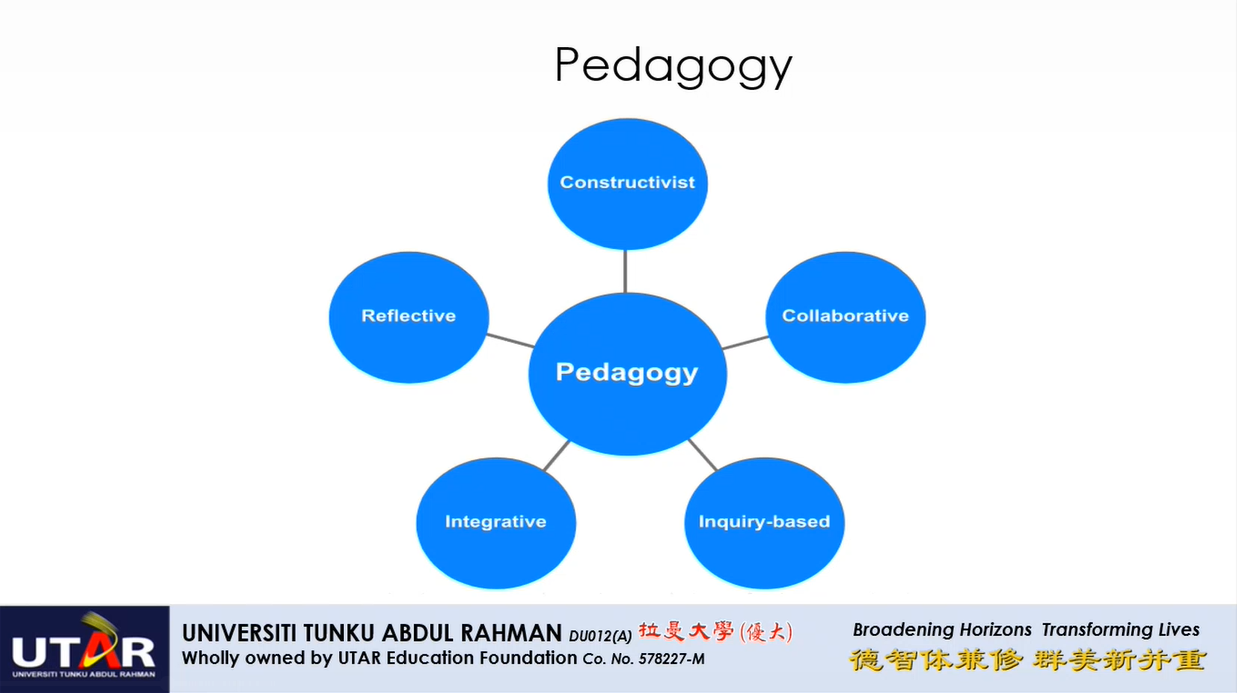
Dr Ooi highlighting SDG Goal 4 initiatives and pedagogy methods
He added, “Malaysia has shown their strong support toward SDG initiatives by the UN and has implemented these goals in our environment, social and economic aspects. UTAR also has adopted SDGs in their initiatives and developed strategic plans which are aligned with the suitable goals. The UTAR SDG report is available on UTAR’s main website. For education, we are largely associated with SDG 4: Quality Education— Ensure inclusive and equitable quality education and promote lifelong learning opportunities for all; in which by 2030, all the learners need to acquire knowledge and skills needed to promote sustainable development.”
“The pedagogy refers to the approach or art of teaching. It is also known as the theory and practice of learning. This method, adopted by educators, shapes their actions, judgements, and other teaching strategies by taking into consideration theories of learning, understandings of students and their needs, and the backgrounds and interests of individual students. The sustainability pedagogy has the potential to be transformative and meaningful when learning is focused more on the environment, social issues and economic issues. Due to the uncertain pandemic, students are not aware of the global, social and environmental issues in the country. As an educator, it is important to include this method of teaching in their lesson in order to nurture the students to have a more holistic understanding, critical thinking and new experiences. There are five types of pedagogy we can implement in our teaching, namely constructivist, collaborative, inquiry-based, integrative and reflective,” Dr Ooi emphasised.
Dr Ooi further explained, “In today’s knowledge-driven economies, access to quality education and the chances for development are essential. As students, we are encouraged to equip ourselves with knowledge and skills to get ready for the challenging working industry. Meanwhile, as lecturers, we cannot stick to the traditional ways of teaching. We need to be more progressive in our teaching by encouraging them to explore leadership skills, have healthy interaction between classmates and lecturers, and inspire them to have the mindset of being responsible for solving problems. We also need to motivate and empower them to be active citizens for a more sustainable future. Furthermore, we need to start transforming our teaching styles with holistic knowledge, challenges and changes, critical thinking, and problem-solving skills. We need to be aware of being global citizens. Therefore, the sustainability pedagogy in education is future-oriented, focusing on protecting environments and creating ecologically and socially global citizens.”
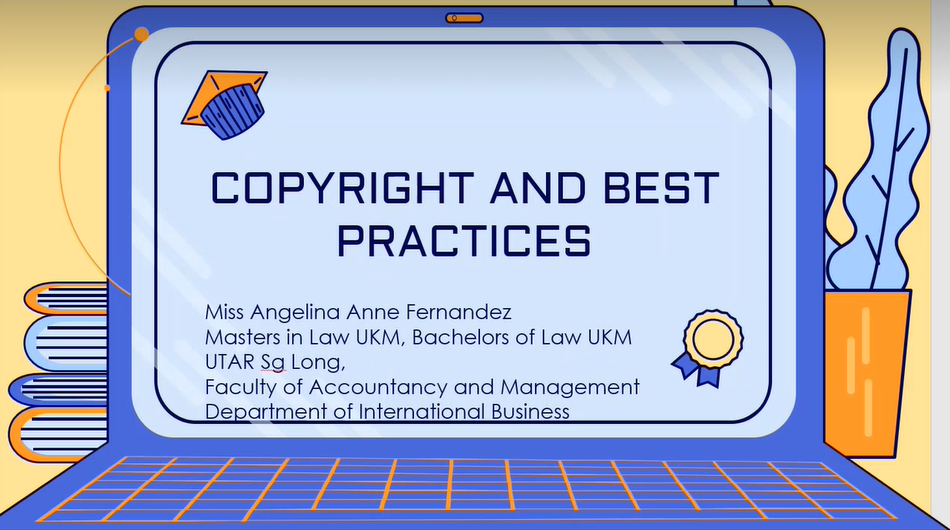
Angelina introducing her presentation topic titled “Copyright and the Best Practices”
The webinar continued with the second speaker Angelina who shared her topic, “Copyright and the Best Practices”. Quoting Børge Brende, she said, “One of the rights in international laws is access to quality education. It is a dominant characteristic that has an indisputable direct connection with economic and social development.” She explained that the level of learning in many countries are highly unequal due to unequal access to educational materials or resources.
She also stressed that the International laws on copyright are embodied in Article 26 (1) Universal Declaration to Human Rights which states that everyone has the right to education, and the education shall be free at least in the elementary and fundamental stages.
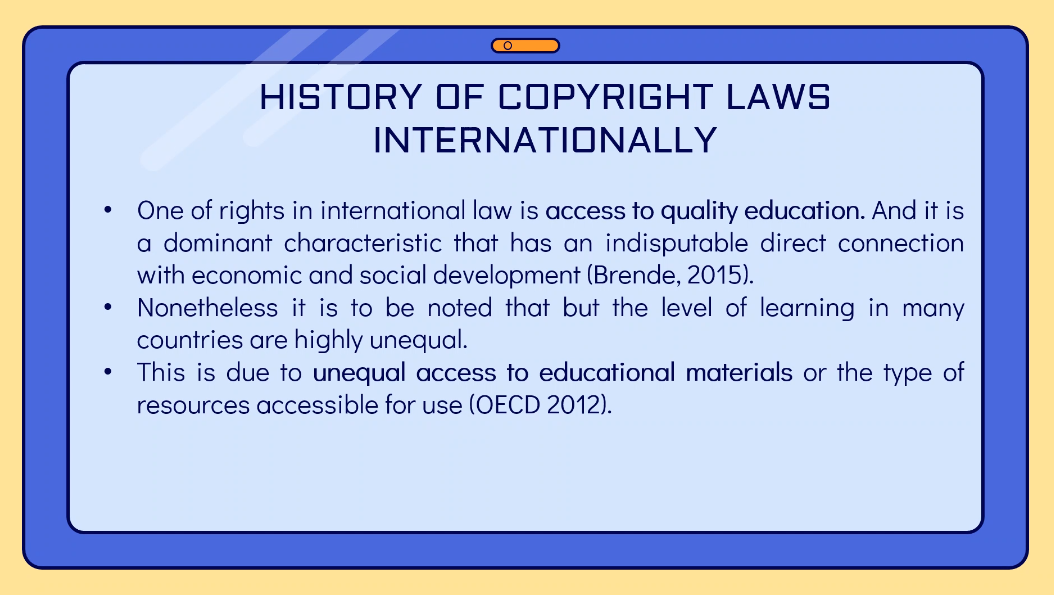
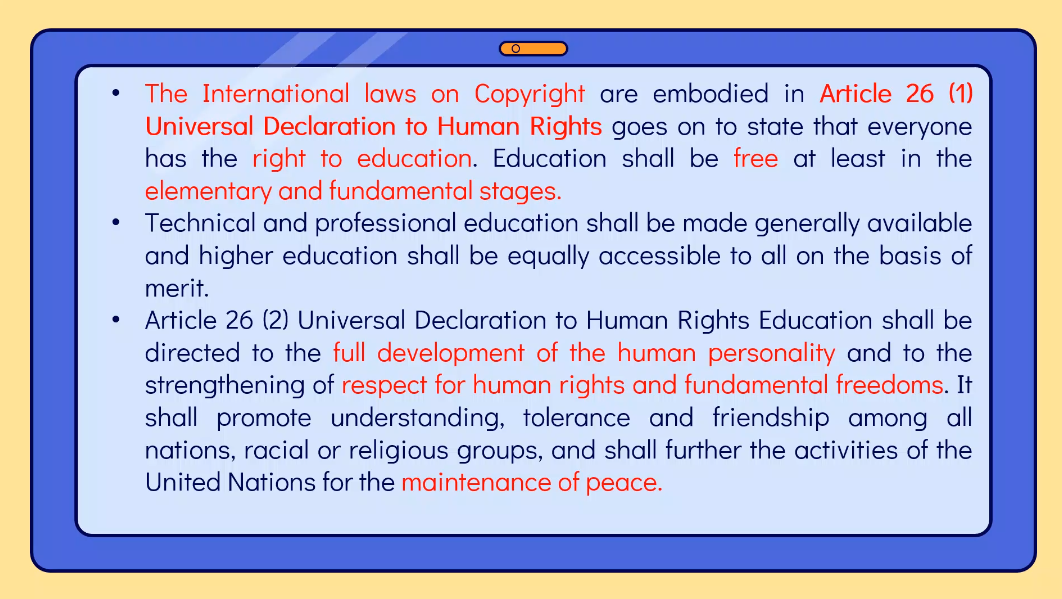
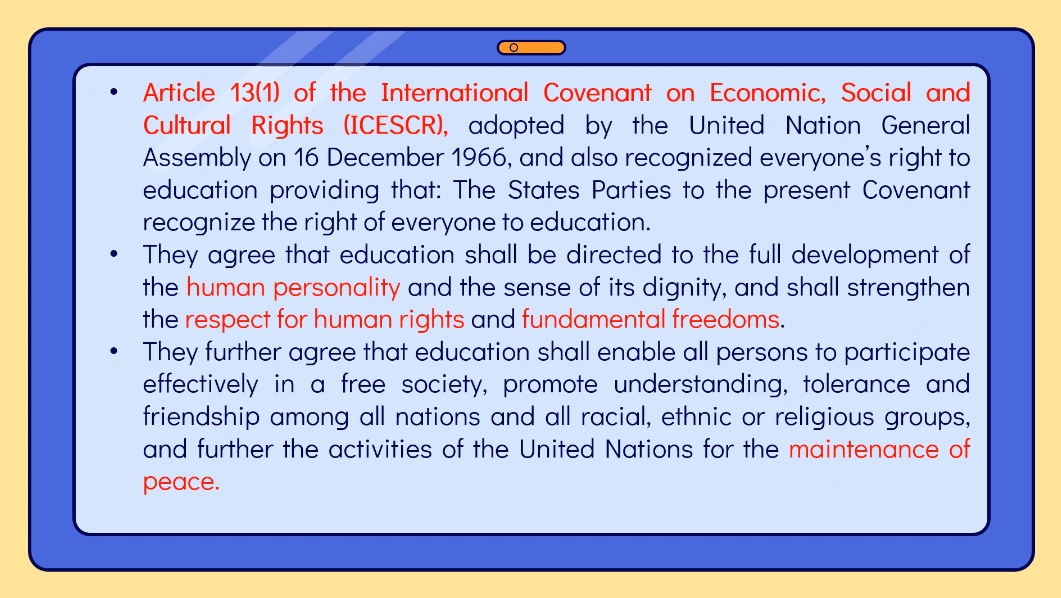
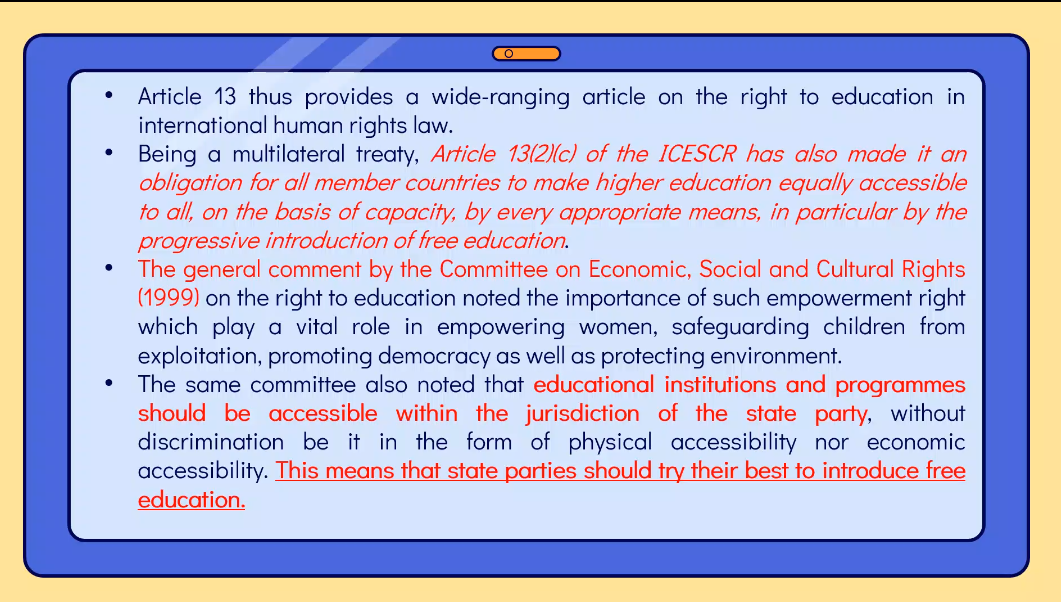
Angelina presenting the history of copyright laws internationally
Angelina said, “The technical and professional education should be made generally available and the higher education should be equally accessible to all based on merit. Besides, Article 26 (2) Universal Declaration to Human Rights Education should be directed to the full development of the human personality and the strengthening of respect for human rights and fundamental freedom. It shall promote the understanding, tolerance and friendship among all nations and further the activities of the UN for the maintenance of peace.” She added for the international legislations, the 2030 Agenda for Sustainable Development agreed by various Head of State under SDG 4 has further pledged towards ensuring inclusive and equitable quality education and promoting lifelong learning opportunities for all. Apart from that, through SDG 4, all UN member states are required to address all forms of exclusion and inequalities in access, participation and learning outcomes.
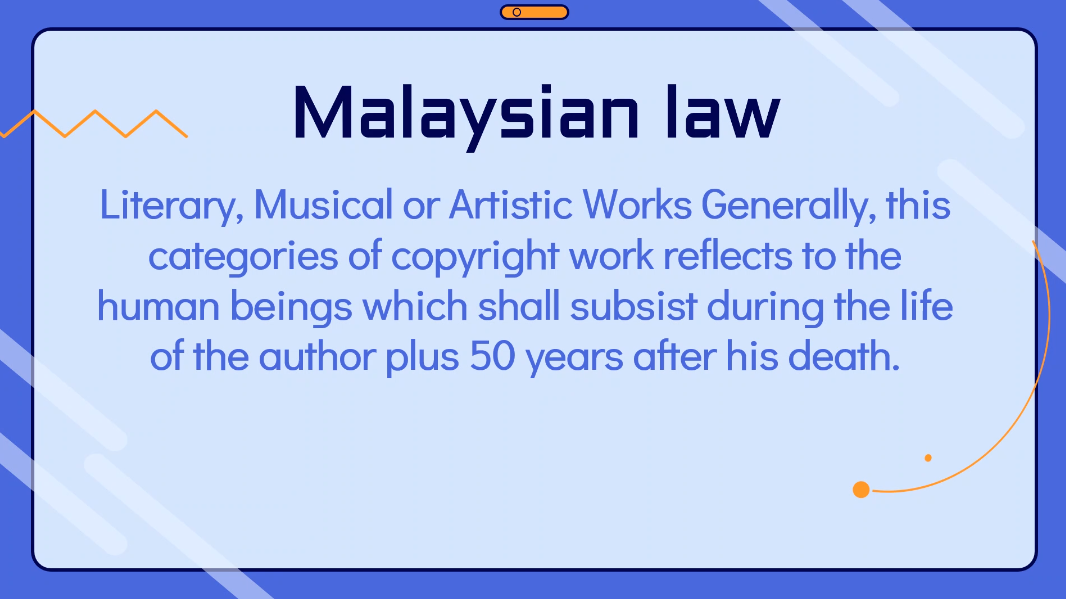
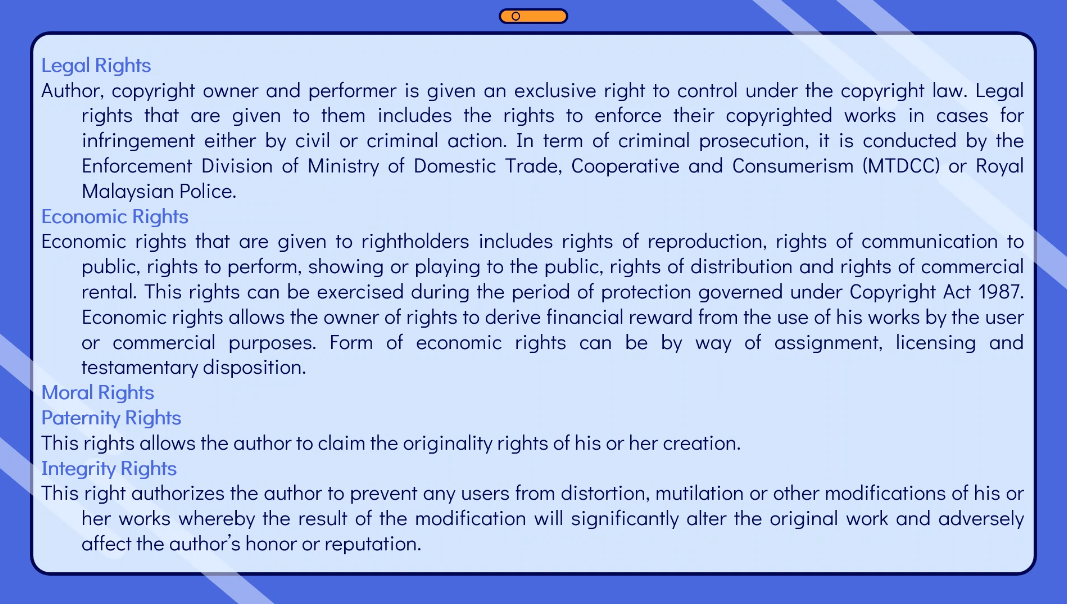
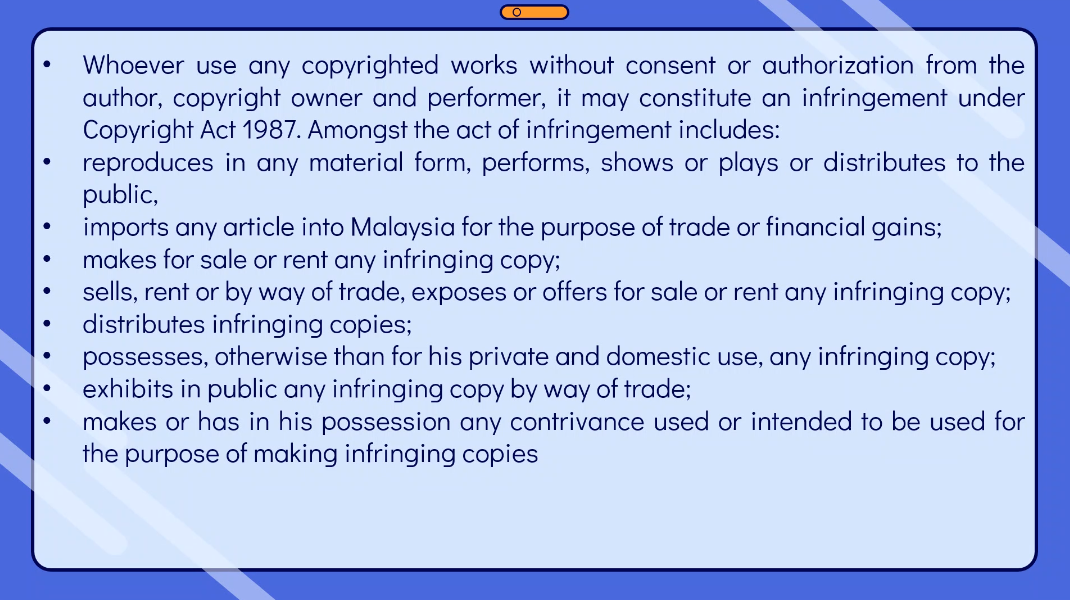
Angelina highlighting the Malaysian law and each of their rights
She then presented the history of copyright laws in Malaysia and highlighted that the Malaysian legislation, embodied under the Copyright Act 1987 (the latest amendment in 2012), is a signatory to the Berne Convention and also a party to the World Trade Organisation Intellectual Property Rights Agreement. She also stated that Malaysia has been alleged as exporters ofpirated products previously, and so various anti-piracy efforts were taken includ ing reinforcing its domestic laws. Moreover, Section 13(2)(a) of the Malaysian Copyright Act 1987 for instance permits uses the copyright works for research or private study purposes by way of fair dealing. What amounts to fair dealing must however subject to different tests where only the court will have the final say on what is fair.
She mentioned that the copyright, according to Malaysian law, will include the literary, musical or artistic works generally. She also added in order to make full use of the vibrancy of information communication technology for the pursuit of education, it is essential that the existing provisions are refined. She continued her talk by highlighting the five rights in Malaysian law, namely legal rights, economic rights, moral rights, paternity rights, and integrity rights. According to her, whoever use any copyrighted works without consent from the author, copyright owner and performer, may constitute an infringement under Copyright Act 1987.
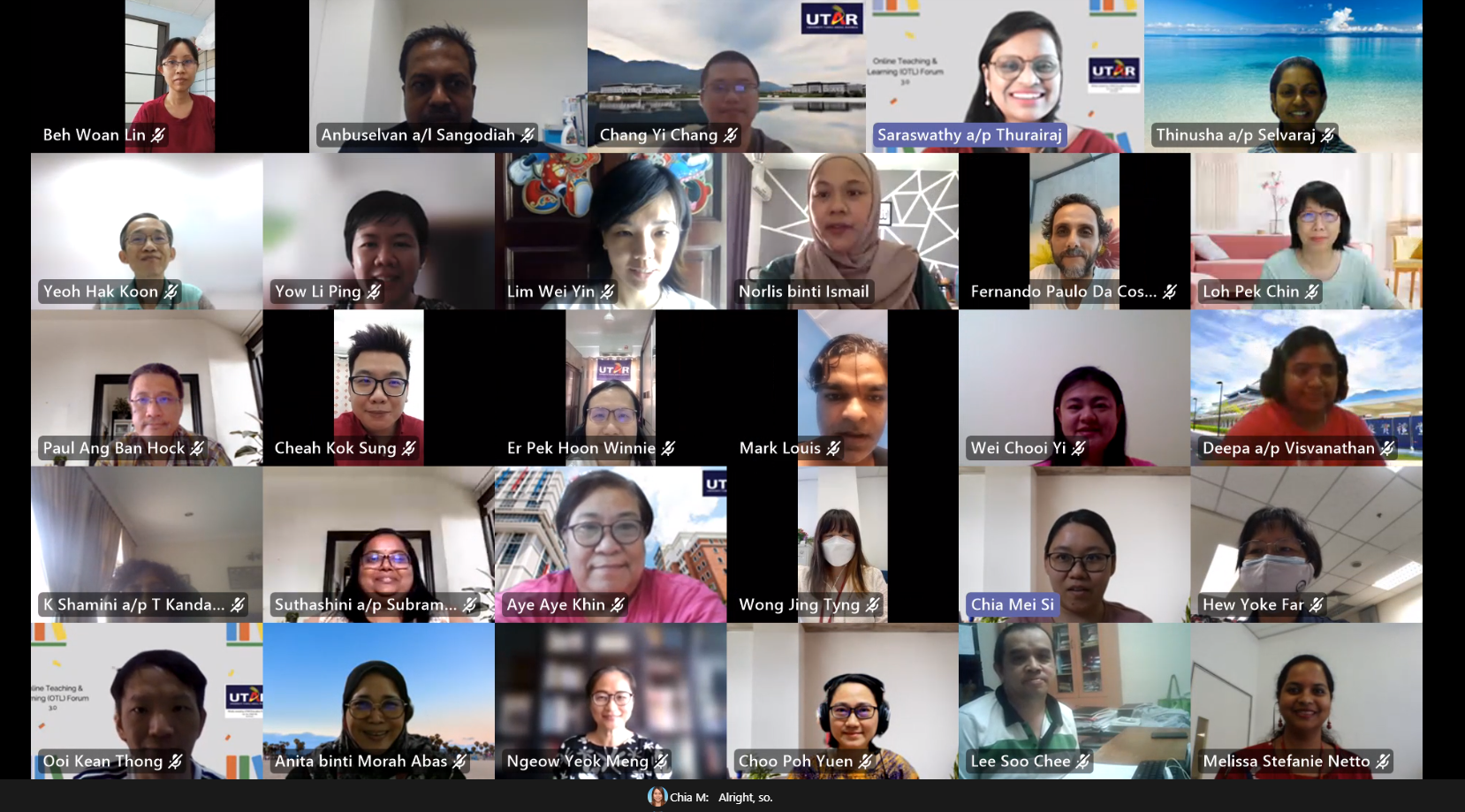
Group photograph at the end of the session
© 2021 UNIVERSITI TUNKU ABDUL RAHMAN DU012(A).
Wholly owned by UTAR Education Foundation (200201010564(578227-M)) LEGAL STATEMENT TERM OF USAGE PRIVACY NOTICE